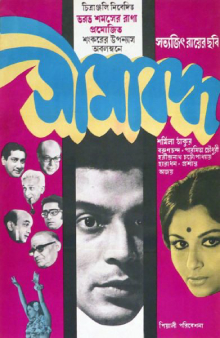Seemabaddha
| Seemabaddha (Company Limited) | |
|---|---|
 | |
| Directed by | Satyajit Ray |
| Written by | Satyajit Ray, based on the novel Seemabaddha by Mani Shankar Mukherjee |
| Produced by | Chitranjali (Bharat Shumsher Jung Bahadur Rana) |
| Starring | Barun Chanda Harindranath Chattopadhyay Sharmila Tagore Haradhan Bandopadhyay Parumita Chowdhury Indira Roy Promod Ganguli G. H. Mani Iyer |
| Cinematography | Soumendu Roy |
| Edited by | Dulal Dutta |
| Music by | Satyajit Ray |
Release date |
|
Running time | 112 minutes |
| Country | India |
| Language | Bengali |
Seemabaddha (Bengali: সীমাবদ্ধ Shimabôddho; English title: Company Limited) is a 1971 social drama Bengali film directed by Satyajit Ray.[1] It is based on the novel Seemabaddha by Mani Shankar Mukherjee. It stars Barun Chanda, Harindranath Chattopadhyay, and Sharmila Tagore in lead roles. The film was the second entry in Ray's Calcutta trilogy, which included Pratidwandi (The Adversary) (1970) and Jana Aranya (The Middleman) (1976). The films deal with the rapid modernization of Calcutta, rising corporate culture and greed, and the futility of the rat race.[2] The film won the FIPRESCI Award at the 33rd Venice International Film Festival, and the National Film Award for Best Feature Film in 1971.[3]
Plot
[edit]
Shyamal (Barun Chanda) is an ambitious sales manager in a British fan manufacturing firm in Calcutta, where he is expecting a promotion shortly. He is married to Dolan and lives in a company flat. He aspires to become the company director.
His sister-in-law, Tutul (Sharmila Tagore), arrives from Patna to stay with them for a few days. She is given a tour of the life they lead and the many upscale spaces they inhabit—the restaurants, the beauty parlours, clubs and race courses. Tutul, whose father Shyamal had once been a student under, greatly admires him and his idealism. Secretly she is envious of her sister's marriage with him.
Life goes on smoothly for Shyamal until he learns that a consignment of fans meant for export is defective just before the shipment of a prestigious order. The problem is that the fans were painted with a flaw. The company is under a contract requiring the shipment be delivered on time. There is a clause permitting delay in case of civil disturbance. To escape blame, Shyamal hatches a plan with the labour officer to provoke a strike at the factory. A factory watchman is badly injured, a false riot is organised, and a lock-out is declared. The delay caused by the strike and riot are used by the company to allow strikebreakers to make needed repairs.
For his "efficient" handling of the crisis, Shyamal is promoted, and there is congratulations all around. However, he has fallen in the eyes of Tutul and himself. He is finally at the top, both successful— and desolate.
Cast
[edit]- Sharmila Tagore as Tutul (Sudarsana)
- Barun Chanda as Shyamal (Shyamalendu) Chatterjee
- Paromita Chowdhury as Dolan (Shyamal's wife)
- Harindranath Chattopadhyay as Sir Baren Roy
- Dipankar Dey as Sen
- Ajoy Banerjee as Talukdar
- Haradhan Bandopadhyay as Nilambar
- Indira Roy as Shyamal's mother
- Promod Ganguli as Shyamal's father
- Miss Shefali
Awards
[edit]- 33rd Venice International Film Festival: FIPRESCI Award
- 1971: National Film Award for Best Feature Film: Satyajit Ray[4]
References
[edit]- ^ Roy Armes (29 July 1987). Third World Film Making and the West. University of California Press. pp. 237–. ISBN 978-0-520-90801-7.
- ^ Andrew Robinson (1989). Satyajit Ray: The Inner Eye. University of California Press. pp. 200–. ISBN 978-0-520-06946-6.
- ^ John W. Hood (2008). Beyond the world of apu: the films of Satyajit Ray. Orient Longman. p. 180. ISBN 978-81-250-3510-7.
- ^ "Seemabaddha @ SatyajitRay.org". Archived from the original on 27 September 2011. Retrieved 13 December 2005.
External links
[edit]- satyajitray.org on the film Archived 27 September 2011 at the Wayback Machine
- UCSC page
- Seemabaddha (Company Limited) at IMDb
